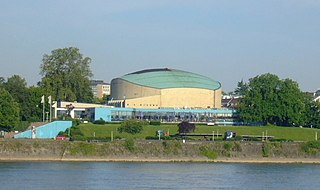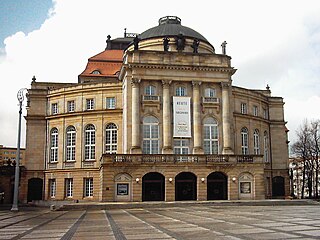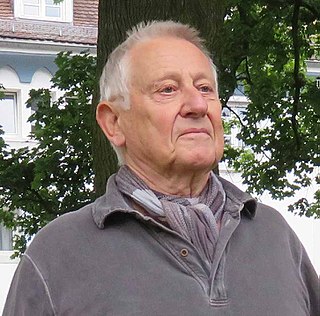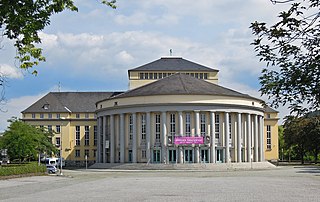
Bad Godesberg is a borough (Stadtbezirk) of Bonn, southern North Rhine-Westphalia, Germany. From 1949 to 1999, while Bonn was the capital of West Germany, most foreign embassies were in Bad Godesberg. Some buildings are still used as branch offices or consulates.
Theater Dortmund is a theatrical organization that produces operas, musicals, ballets, plays, and concerts in Dortmund, Germany. It was founded as the Stadttheater Dortmund in 1904. Supported by the German Government, the organization owns and operates several performance spaces.

Theater Regensburg is a theatrical organization that produces operas, musicals, ballets, plays, and concerts in Regensburg, Germany. The organization operates several performance venues throughout the city.

The Staatstheater Nürnberg is a German theatre company in Nuremberg, Bavaria. The theatre is one of four Bavarian state theatres and shows operas, plays, ballets and concerts.

Theater Münster is a municipal theatre in Münster, North Rhine-Westphalia, Germany, for plays and music theatre. When it opened in 1956 it was regarded as the first new theatre building in Germany after World War II. It integrates some ruins of the former theatre and musical school destroyed in the war.

The Staatstheater Darmstadt is a theatre company and building in Darmstadt, Hesse, Germany, presenting opera, ballet, plays and concerts. It is funded by the state of Hesse and the city of Darmstadt. Its history began in 1711 with a court theatre building. From 1919 it was run as Landestheater Darmstadt. The present theatre was opened in 1972 when the company was named Staatstheater.

The Beethovenfest is a festival of classical music in Bonn, Germany, dedicated mostly to the music of Ludwig van Beethoven who was born there. It dates back to 1845, when the composer's 75th anniversary of birth was celebrated with unveiling his monument and performing major works.

Theater Magdeburg is the principal theatre organization in Magdeburg, Germany, the capital of the state Saxony-Anhalt. It was formed in 2004 with the merger of two theatres, the Theater der Landeshauptstadt and the Freie Kammerspiele. It presents performances of opera, ballet, musical theatre, concerts, and plays. Theater Magdeburg has its own opera, ballet, and theatre companies and is the home of the Magdeburg Philharmonic Orchestra. It has three main performing venues. the Opernhaus, the Schauspielhaus (Playhouse), and the DomplatzOpenAir, which is set up each summer near Magdeburg Cathedral.

Theater Chemnitz is the municipal theatre organization in Chemnitz, Germany. Performances of opera, ballet, plays, symphonic concerts, and puppet theatre take place in its three main venues: the Opernhaus Chemnitz, the Stadthalle Chemnitz, and the Schauspielhaus Chemnitz. The award-winning opera company has produced a series of rarely performed works, and several German premieres. Its orchestra is named the Robert-Schumann-Philharmonie.
Rudolf Sellner, born Gustav Rudolf Sellner was a German actor, dramaturge, stage director, and intendant. He represented in the 1950s a radical Instrumentales Theater. After decades of acting and directing plays, he turned to staging operas, and was a long-time intendant of the Deutsche Oper Berlin from 1961, when the Berlin Wall was built. He staged notable world premieres, including Ernst Barlach's play Der Graf von Ratzeburg in 1951, Ionesco's Mörder ohne Bezahlung in 1958, Giselher Klebe's Alkmene in 1961 for the opening of the Deutsche Oper, and Aribert Reimann's opera Melusine in 1971.

Städtische Bühnen Frankfurt is the municipal theatre company of Frankfurt, the largest city of Hesse Germany. The name dates back to 1919. The company is structured today in two organisations, Oper Frankfurt for opera, and Schauspiel Frankfurt for drama (Schauspiel).

Hansgünther Heyme is a German theatre director and prominent figure in the Regietheater movement of the 1960s and 70s. Born in Bad Mergentheim, he studied at Heidelberg University and then under the German director Erwin Piscator. Heyme was the artistic director of the Staatstheater Wiesbaden from 1964 to 1967, the Schauspiel Köln from 1968 to 1979, the Württemberg State Theatre in Stuttgart from 1979 to 1986, the Ruhrfestspiele theatre festival from 1990 to 2003, and the Theater im Pfalzbau in Ludwigshafen from 2004 to 2014. Now in his 80s, he continues to work as a freelance director.

Theater Saarbrücken, officially Saarländisches Staatstheater since 1971, is the state theatre of Saarland in its capital Saarbrücken, Germany. It has several divisions and offers annually around 30 new productions in around 700 events for more than 200,000 people. Its venues are Großes Haus, Alte Feuerwache, Congresshalle and sparte4. While theatre in Saarbrücken has a long history, the present main venue was completed in 1938, with plans commissioned by the Nazi regime.
Harry Buckwitz was a German actor, theatre director and theatre manager. He was general manager of the Städtische Bühnen Frankfurt from 1951 and 1967, where he was responsible for opera and plays, and initiated a new house for them after the formerly separate theatres had been destroyed in World War II. He is known for Brecht productions, in Frankfurt and at the Schauspielhaus Zürich from 1970 to 1977.

The Redoute in Bad Godesberg, now part of Bonn, North Rhine-Westphalia, Germany, is a hall opened in 1792 for balls of the court of Archduke Maximilian Francis of Austria. When Bonn was the location of the government of the Federal Republic of Germany, from 1949 to 1990, state receptions were held at the Redoute. Today, the listed historical building is used for events.

Stadttheater Magdeburg was the municipal theatre of Magdeburg, Germany. It was opened in 1878, was at times of national importance for operas, and was destroyed during World War II.
Bernhard Helmich is a German theatre manager.

The Schauspielhaus Bad Godesberg is the largest theatre in the city of Bonn and the first new theatre building in the Federal Republic of Germany in the post-war period. The building was constructed in the Bad Godesberg city centre in the early 1950s. It now belongs to the Alt-Godesberg district of Bonn and is located at Theaterplatz 9 / Am Michaelshof 9 ; it is under Denkmalschutz.

The Theater Trier is the municipal theatre of Trier, Rhineland-Palatinate, offering opera and musical, dance and drama. The company dates back to 1802. The current house was completed in 1964, and needs renovation. The director (Intendant) since 2018 is Manfred Rolf Langner
















